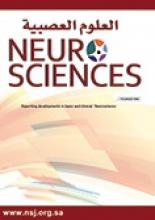Abstract
OBJECTIVE: To investigate the relation between gender, sociodemographic factors, pain, smoking, and the level of anxiety and depressive symptoms after traumatic spinal cord injury (TSCI) in a Saudi sample.
METHODS: We conducted a cross-sectional study from November 2009 to April 2011, in 102 (age range 17-70 years; 84 males, 18 females) TSCI patients admitted to the Spinal Cord Injury Unit, Sultan Bin Abdulaziz Humanitarian City, Riyadh, Saudi Arabia. We used the Hospital Anxiety and Depression Scale (HADS) to measure the level of anxiety and depression of the study population. The demographic variables were recorded.
RESULTS: Compared to male TSCI patients, the level of anxiety (p=0.0001), depression (p=0.0045), and total HADS (p=0.0002) scores were significantly higher in females. The correlation between level of education and anxiety and depression showed that patients with a university education had higher anxiety (p=0.0115), depression (p=0.0437), and total HADS (p=0.0272) than patients with a lower education level. The TSCI patients with pain reported more anxiety and depression than patients who did not have pain. Compared to non-smokers, the smokers showed marked but insignificant higher levels of anxiety and depression.
CONCLUSION: Women with TSCI are at a significantly higher risk of having anxiety and depressive symptoms. Level of university education was modestly correlated with higher level anxiety and depression in this population.
- Copyright: © Neurosciences
Neurosciences is an Open Access journal and articles published are distributed under the terms of the Creative Commons Attribution-NonCommercial License (CC BY-NC). Readers may copy, distribute, and display the work for non-commercial purposes with the proper citation of the original work.






